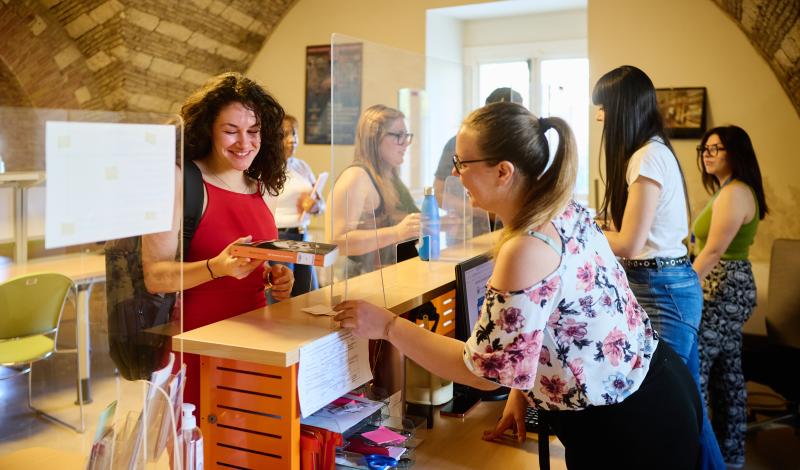
The PhD in Humanities offers an advanced training program structured into three curricula: Philology and Ancient Literatures; Modern and Contemporary Cultures and Literatures and Archeology.The program offers an integrated and multifaceted approach to the humanities, considered as a network of interconnected disciplines from synchronic, diachronic, and methodological perspectives. At the same time, it embraces new digital contexts. Advanced training covers philology, literature, history, art history, archaeology, and ethno-anthropology and benefits from the interaction among these fields, spanning from the ancient world to the contemporary era and including innovation and digital transformation. The program also promotes engagement with the international academic community, encouraging exchange and mutual collaboration. The program supports co-supervised dissertations and offers the opportunity to spend at least one semester at foreign universities. It also allows for a period of at least one month at other Italian universities. Additionally, based on the research projects undertaken, students can spend at least one semester within public administration bodies, institutions, or research centers.
Thematic Areas:
The strong interdisciplinary nature of the training project, the specific educational objectives, and the expected learning outcomes - in terms of knowledge, skills, and competencies, both disciplinary and transversal - are consistent with the cultural and professional profiles of the graduates, clearly defined for the three curricula, as well as with the available financial and structural resources. Specifically, the three curricula are dedicated to:
- The study of the ancient world as a foundational element of both national and European culture, using the tools of classical philology and the textual evidence of Greek and Latin literature. This also includes the analysis of how the ancient world has been interpreted and reimagined in later periods.
- The study of modern and contemporary European cultures and literatures. This includes exploring language and communication, the relationship between literature and other art forms, as well as intercultural and intermedial connections.
- A multidisciplinary study of tangible and intangible cultural and archaeological assets from both the ancient world and the present day. The focus is on archaeological, ethno-anthropological, and art-historical fields, including their digital applications.
Coordinatore:
Professors from Italian Universities
- Berardi Caterina Celeste, Università di Foggia
- Bianchi Nunzio, Università di Bari
- Caroli Menico, Università di Foggia
- Catone Antonella, Università di Foggia
- Conte Floriana, Università di Foggia
- Daniele Antonio Rosario, Università di Foggia
- De Domenico Carlo, Università di Siena
- Derosa Luisa Maria Sterpeta, Università di Foggia
- Di Benedetto Angela, Università di Foggia
- Di Cesare Riccardo, Università di Foggia
- Dimundo Rosa Alba, Università di Bari
- Drago Anna, Università di Bari
- Eramo Immacolata, Università di Bari
- Favia Pasquale, Università di Foggia
- Giuliani Roberta, Università di Bari
- Goffredo Roberto, Università di Foggia
- Ingravallo Tiziana, Università di Foggia
- Ingrosso Paola, Università di Bari
- Lagioia Alessandro, Università di Bari
- Leone Danilo, Università di Foggia
- Lomiento Vincenzo, Università di Foggia
- Marchi Maria Luisa, Università di Foggia
- Masselli Grazia Maria, Università di Foggia
- Minervini Francesco Saverio, Università di Foggia
- Montecalvo Maria Stefania, Università di Foggia
- Otranto Rosa, Università di Bari
- Palmieri Rossella, Università di Foggia
- Palumbo Gianni Antonio, Università di Foggia
- Pellegrino Matteo, Università di Foggia
- Perrone Capano Lucia, Università di Foggia
- Picciaredda Stefano, Università di Foggia
- Pinto Pasquale Massimo, Università di Bari
- Ragno Tiziana, Università di Foggia
- Riccio Anna, Università di Foggia
- Russo Michele, Università di Foggia
- Sardelli Maria, Università di Foggia
- Schiano Claudio, Università di Bari
- Simonetti Enrico Salvatore, Università Telematica Pegaso
- Sivo Francesca, Università di Foggia
- Solaro Giuseppe, Università di Foggia
- Tedeschi Antonella, Università di Foggia
- Totaro Pietro, Università di Bari
- Turchiano Maria, Università di Foggia
- Tuzzo Sabina, Università di Salento
- Valerio Sebastiano, Università di Foggia
Professors from foreign Universities
- Arriaga Florez Mercedes, Università Di Siviglia
- Benetos Dionysios , The National & Kapodistrian University of Athens
- Di Nunzio Novella, Università di Vilnius
- Duplouy Alain, Università Paris 1 Panthéon-Sorbonne
- Hurch Bernhard, Universität Graz
- Krumeich Ralf, Universität Bonn
- Martin Clavijo Milagro , Università Di Salamanca
- Michalopoulos Andreas N, The National & Kapodistrian University of Athens
- Papaioannou Sophia, The National & Kapodistrian University of Athens
- Quirós Castillo Juan Antonio, University of the Basque Country
- Radulescu Raluca, Università di Bucarest
- Rella Angelo, Università di Stettino
- Vroom Joanita, Università di Leiden
- Zelic Tomislav, Università di Zara
- Öhlschläger Claudia, Universität Paderborn
Download the PhD Program Training Plan.
The online educational activities will be held in the virtual classroom available on the University’s E-learning Portal.
In light of the international debate on the role of universities in the field of knowledge and their relationship with local communities, as well as ANVUR’s guidelines on enhancing interactions between universities and society—referred to as the University’s Public Engagement—the PhD program in Humanities aims to promote activities directed towards society and the territory. Recognizing that disseminating research results is a core objective of the activities related to Public Engagement, the PhD in Humanities seeks to foster dialogue not only with the national and international academic community, but also with society and local communities.
This is achieved through the organization of seminars, conferences, and events involving faculty members and students, both within the Department and in collaboration with other institutions (public and private entities, associations, schools, research centers, etc.).
To this end, doctoral candidates are encouraged throughout their program to participate in—and/or organize—events that position them as active contributors to the dissemination of research beyond academic circles.
Public Engagement Activities of the Department of Humanities.
Browse the section
- Coordinator:
prof.ssa Lucia Perrone Capano - Contact Email:
dottoratoscienzeumanistiche@unifg.it

